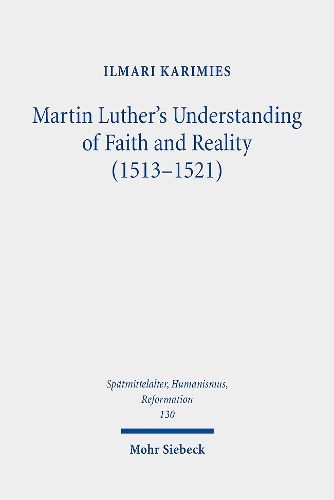Readings Newsletter
Become a Readings Member to make your shopping experience even easier.
Sign in or sign up for free!
You’re not far away from qualifying for FREE standard shipping within Australia
You’ve qualified for FREE standard shipping within Australia
The cart is loading…






Ilmari Karimies investigates Martin Luther’s understanding of reality and faith. He examines Luther’s understanding of reality from three perspectives: firstly God as the self-giving highest good uniting opposites and hiding beneath them; secondly the visible and invisible world; and thirdly human beings as tripartite (body, soul, spirit) and bipartite (flesh-spirit). The author explores the cognitive conflict between these in relation to spirit’s grasping of God and the invisible world with reference to Augustinian Platonism. He analyses aspects of faith from the perspective of the theory of divine illumination and shows that Luther represents a realistic Augustinian view. Faith functions as the theological intellect, grasping the invisible world and showing human beings the future good in a manner similar to the medieval notion of ecstatic knowledge. It differs from vision in glory because of sin, as mixed with humanity, and as partial knowledge.
$9.00 standard shipping within Australia
FREE standard shipping within Australia for orders over $100.00
Express & International shipping calculated at checkout
Ilmari Karimies investigates Martin Luther’s understanding of reality and faith. He examines Luther’s understanding of reality from three perspectives: firstly God as the self-giving highest good uniting opposites and hiding beneath them; secondly the visible and invisible world; and thirdly human beings as tripartite (body, soul, spirit) and bipartite (flesh-spirit). The author explores the cognitive conflict between these in relation to spirit’s grasping of God and the invisible world with reference to Augustinian Platonism. He analyses aspects of faith from the perspective of the theory of divine illumination and shows that Luther represents a realistic Augustinian view. Faith functions as the theological intellect, grasping the invisible world and showing human beings the future good in a manner similar to the medieval notion of ecstatic knowledge. It differs from vision in glory because of sin, as mixed with humanity, and as partial knowledge.